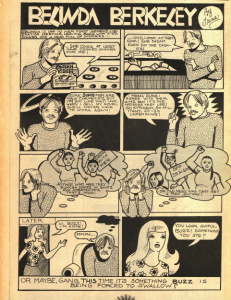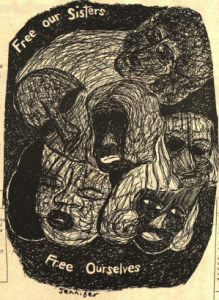“Belinda Berkeley” by Irina, a political comic strip published in It Ain’t Me Babe, illustrates the irony of a husband critiquing the Second Wave Feminist Movement. It Ain’t Me Babe is a radical feminist newspaper created the Berkeley Women’s Liberation in Berkeley, California in 1970. This cartoon focuses on the partner dynamics of a stay-at-home novelist husband and a wife who is an active member of the movement.

“Belinda Berkeley” by Irina is a political comic strip illustrating the partner dynamics during the Second Wave Feminist Movement.
The first two panels illustrate Buzz’s annoyance at Belinda for not taking care of the household duties before leaving for her women’s liberation meeting. Buzz says with frustration, “She could at least have cooked dinner for me!” (Irina 20). This criticism from Buzz demonstrates how men diminished the women’s mission for liberation during the Second Wave Feminist Movement. Men expected women to prioritize the nuclear family and its duties before taking care of themselves, confining women to the role of a housewife. The next two panels reveal the irony behind Buzz’s irritation when he says, “Sure some men are male chauvinists, but I’m not like that!” Buzz continues to say “I mean, sure I agree, with their aims, but it’s the methods they use! So strident, so militant, so-so unfeminine!” (Irina 20). Buzz claims he is not a chauvinist but undermines women’s methods for their liberation. Like Buzz, many men believed the radical feminists participating in the movement were masculine, opposite of what women should present themselves as. Buzz conforms to the social stigma that women are supposed to be feminine by describing the methods as “so-so unfeminine”; yet he still claims he is not a chauvinist.

Published in the same newspaper, Jennifer illustrates many morphed faces of women with the caption “Free our sisters; Free ourselves.” Many women sought liberation from their controlling spouses and found solidarity with other women during the movement.
Buzz continues to express his misogynistic views through slurs and rude remarks, claiming women participating in the movement are a “bunch of dykes in boots and sweatshirts” and “old maids who can’t get a man anyway!” (Irina 20). Buzz resorts to a misogynistic attack as a response to his threatened masculinity. Calling women “dykes” fuels his frail masculine image and creates a superior complex against women. The hint of a homophobic tone demonstrates how Buzz is afraid that Belinda will join these “dykes” and “old maids” in challenging the confining nuclear family and the restricting society.
The cartoon ends with Belinda coming home and noticing the irritation on Buzz’s face. Belinda immediately asks Buzz if something is wrong as Buzz sits on a couch with droopy eyes and shrugged shoulders ignoring her. The ending line of the cartoon states, “Or maybe gang, this time it’s something Buzz is being forced to swallow?” (Irina 20). Buzz’s hypocrisy and misogynistic views are being challenged by his own wife. He is being forced to swallow his masculine insecurity and forced to acknowledge the momentum and power the feminist movement gave women.
Works Cited:
Irina. “Belinda Berkeley.” It Ain’t Me Babe, vol. 1, no. 9, pp 20.
It Ain’t Me Babe, vol. 1, no. 9, July 2-23 1970.
Jennifer. “Untitled.” It Ain’t Me Babe, vol. 1, no. 9, pp 19.
